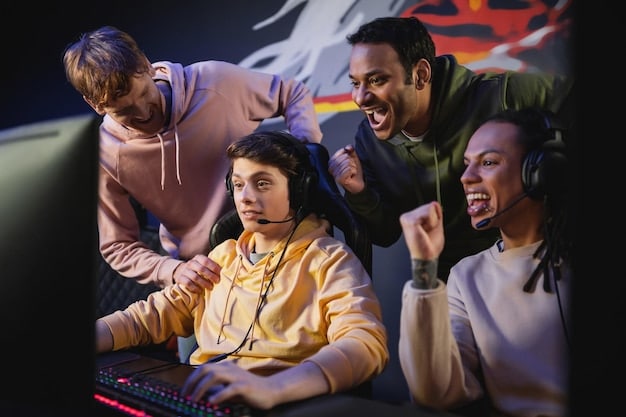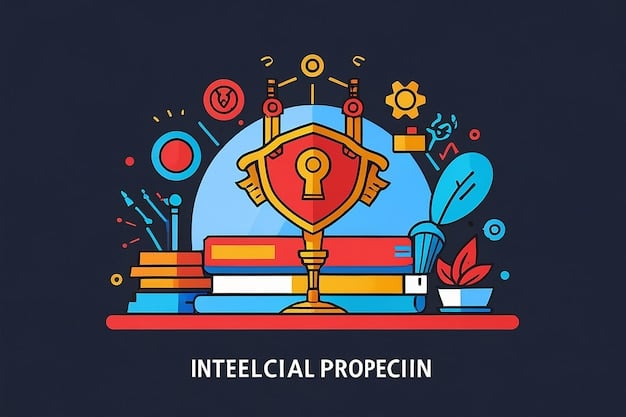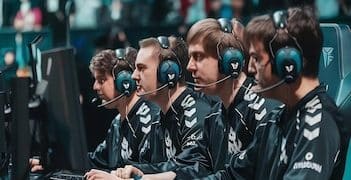Esports Law: Navigating the Legal Issues in US Competitive Gaming

Esports law involves the unique legal challenges within competitive gaming in the US, covering player contracts, intellectual property, sponsorships, and regulatory frameworks. Understanding these aspects is crucial for gamers, teams, and organizations.
The world of esports has exploded in popularity, becoming a multi-billion dollar industry. With such rapid growth comes the need for legal frameworks that address the unique challenges of competitive gaming in the US. This is where esports law comes into play, a developing field encompassing everything from player contracts to intellectual property.
Whether you’re a professional gamer, a team owner, or an aspiring entrepreneur in the esports scene, understanding the nuances of esports law is essential. Let’s dive into the key areas shaping the legal landscape of competitive gaming in the US.
Esports Law: Understanding the Basics
Esports law is a complex field that touches on many areas of traditional law, adapting them to the unique context of competitive gaming in the US. It’s not just about rules and regulations within games; it encompasses business, contracts, intellectual property, and more. Understanding these basics is the first step in navigating this dynamic landscape.
Key Areas of Esports Law
Several key areas form the foundation of esports law. Let’s take a closer look at each:
- Contract Law: Player contracts, sponsorship agreements, and broadcasting rights all fall under contract law.
- Intellectual Property Law: Protecting game developers’ rights, team logos, and streaming content.
- Immigration Law: Esports teams frequently include international players who require specialized visas.
- Gaming Law: Addressing betting, fantasy leagues, and regulatory frameworks around esports.
These areas are constantly evolving as the esports industry grows and new legal challenges arise. The legal landscape of esports in the US is still being shaped by court cases, legislation, and industry best practices.

Staying informed about legal developments is crucial for anyone involved in esports. Engaging with legal professionals who specialize in this area is a wise investment for protecting your interests and ensuring compliance.
In conclusion, understanding the basics of Esports Law: Understanding the Legal Landscape of Competitive Gaming in the US is essential for success in the competitive gaming world. It helps players, teams, and organizations protect their rights and navigate the legal challenges of this rapidly growing industry.
Player Contracts and Esports Organizations
Player contracts are the backbone of professional esports, defining the rights and responsibilities of both players and organizations in the US. These contracts dictate everything from compensation to performance expectations, making them a critical aspect of esports law.
Essential Elements of Player Contracts
A well-drafted player contract should include several key provisions:
- Salary and Bonuses: Clear details on compensation, including base salary, performance-based bonuses, and prize money sharing.
- Term and Termination: The duration of the contract and conditions under which it can be terminated by either party.
- Rights and Obligations: Player responsibilities, such as attending practice, participating in tournaments, and maintaining a professional image.
- Intellectual Property: Ownership of streaming rights, endorsements, and other intellectual property generated by the player.
Beyond these core elements, player contracts may also address issues like non-compete clauses, dispute resolution mechanisms, and confidentiality agreements. Understanding these details is crucial for both players and organizations to ensure a fair and enforceable agreement.
The relationship between players and organizations is governed by these contracts, which makes it crucial for them to be well-defined and compliant with US esports law. Disputes are common, but a solid contract provides the framework for resolution.
Intellectual Property in Esports
Intellectual property (IP) is a crucial aspect of esports law. It protects the rights of game developers, teams, and content creators in US competitive gaming. This includes game code, characters, logos, and streamed content. Ensuring adequate IP protection is essential for maintaining the integrity and value of the esports ecosystem.
Protecting Game Developers’ Rights
Game developers hold the copyright to their games, controlling how they are used and distributed. This includes the right to prohibit unauthorized modifications, private servers, and other activities that infringe on their IP. Effective IP protection helps developers maintain the integrity of their games and prevent unfair competition.

Moreover, teams and players often create their own brands, logos, and content, which are also protected by IP laws. This can include trademarks for team names and logos, as well as copyrights for streamed content and merchandise. Protecting these assets is crucial for maintaining brand identity and generating revenue.
Intellectual property laws are a cornerstone of esports, and it is critical to understand how they apply. Strong IP protection fosters innovation, investment, and fair competition in the industry.
Sponsorships, Advertising, and Endorsements
Sponsorships, advertising, and endorsements form a significant part of the revenue streams in esports in the US. However, these activities are governed by a complex web of regulations and legal considerations that fall under the umbrella of esports law. Understanding these rules is crucial for teams, players, and sponsors.
Sponsorship Agreements
Sponsorship agreements are contracts between esports teams or players and companies that provide financial support in exchange for brand promotion. These agreements typically outline the specific marketing activities the team or player will undertake, such as displaying the sponsor’s logo on their jerseys, promoting their products on social media, or appearing in commercials.
These agreements should address issues like exclusivity clauses, termination rights, and dispute resolution mechanisms. Compliance with advertising regulations is also essential, ensuring that all marketing activities are truthful and not misleading. Failure to comply with these regulations can result in fines, legal action, and damage to brand reputation.
Endorsement deals are individual contracts between a player and a brand, where the player promotes the brand’s products or services. These deals often involve social media posts, appearances at events, and other marketing activities. Esports Law: Understanding the Legal Landscape of Competitive Gaming in the US ensures that all participants act ethically and within legal boundaries.
Gambling, Betting, and Esports
The rise of esports has led to increased gambling and betting activities in the US, creating new legal challenges for the industry. Navigating these challenges requires a careful understanding of the applicable laws and regulations, which fall under esports law.
Legal Framework for Esports Betting
Esports betting is subject to various state and federal laws, including the Wire Act and the Unlawful Internet Gambling Enforcement Act (UIGEA). These laws regulate online gambling and prohibit the transmission of betting information across state lines. However, the interpretation and application of these laws to esports betting are complex and vary depending on the state.
Several states have legalized or are considering legalizing esports betting, but the regulatory frameworks differ significantly. Some states treat esports betting similarly to traditional sports betting, while others impose additional restrictions. It’s critical to stay abreast of these developments to ensure compliance.
The relationship between esports and gambling is a hot topic in US Esports Law: Understanding the Legal Landscape of Competitive Gaming in the US. By understanding the legal frameworks in place, teams, players, and enthusiasts can navigate the landscape responsibly.
Future of Esports Law in the US
As esports continues to evolve, the legal landscape surrounding it will also change. Emerging technologies, new business models, and evolving social norms will all shape the future of esports law in the US. It is important to understand these potential developments and prepare for the challenges and opportunities they may bring.
Emerging Legal Issues:
- Data Privacy: Protecting player data and ensuring compliance with privacy regulations which is a key area of Esports Law: Understanding the Legal Landscape of Competitive Gaming in the US.
- AI and Automation: The use of artificial intelligence and automation in esports raises complex legal questions about intellectual property, competition, and liability.
- International Regulations: As esports becomes more global, international regulations and cross-border legal issues will become increasingly important.
Staying informed about legal developments and engaging with legal professionals specializing in esports is crucial for navigating this evolving landscape. By proactively addressing these challenges, stakeholders can help ensure the long-term success and sustainability of the esports industry in the US.
| Key Point | Brief Description |
|---|---|
| 🎮 Player Contracts | Agreements defining player-organization rights and responsibilities. |
| 🛡️Intellectual Property | Protection of game developers, teams, and content creators’ rights. |
| 🤝 Sponsorships | Agreements between teams/players and companies for brand promotion. |
| 💸 Esports Betting | Navigating the legal challenges of esports gambling activities. |
Frequently Asked Questions
Player contracts should clearly detail salary, term, rights, and intellectual property. These contracts define the relationship between players and organizations, crucial for both parties.
Intellectual property protection covers game code, team logos, and streamed content. It is essential for maintaining the integrity and value of the esports ecosystem in the US.
Teams should consider advertising regulations and exclusivity clauses. Sponsorships form a significant part of revenue in US esports, but they require careful legal navigation.
Gambling and betting activities are subject to state and federal laws, including the Wire Act and UIGEA. These laws regulate online gambling, creating legal challenges for the esports industry.
Emerging issues include data privacy, AI, and international regulations. Staying informed about these developments is crucial for navigating the evolving esports landscape in the US.
Conclusion
Esports law is an evolving and dynamic field. It presents both challenges and opportunities. Understanding these legal aspects is critical for anyone involved in competitive gaming in the US. Keeping informed and engaging with legal professionals is essential for navigating this complex landscape.





